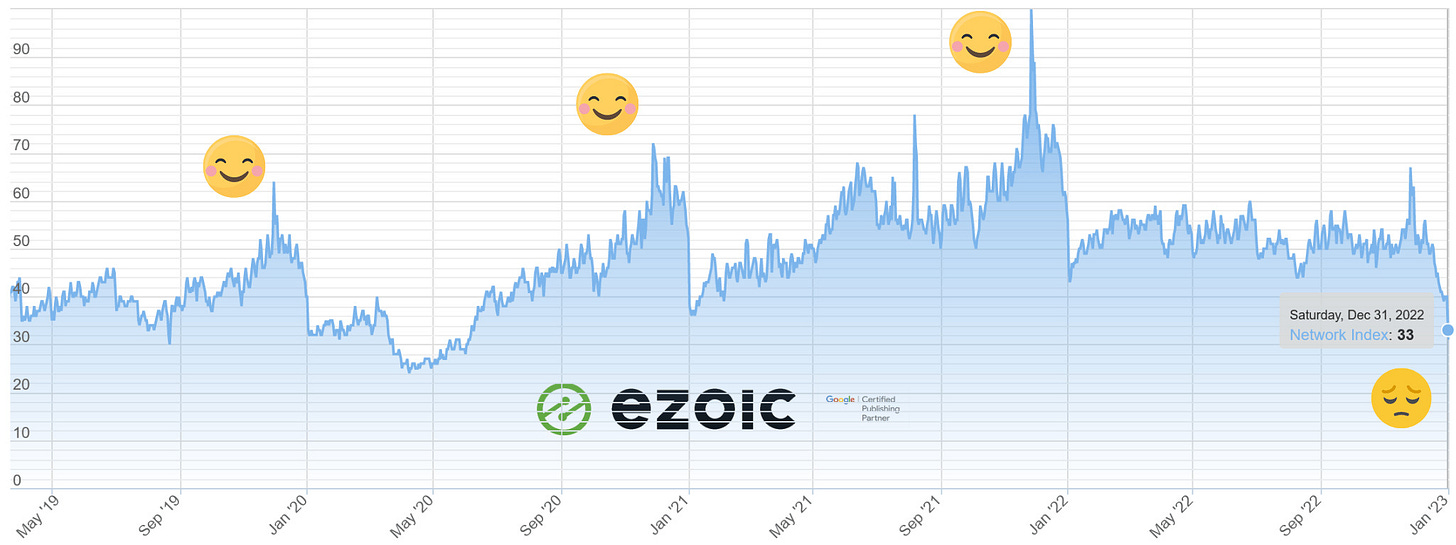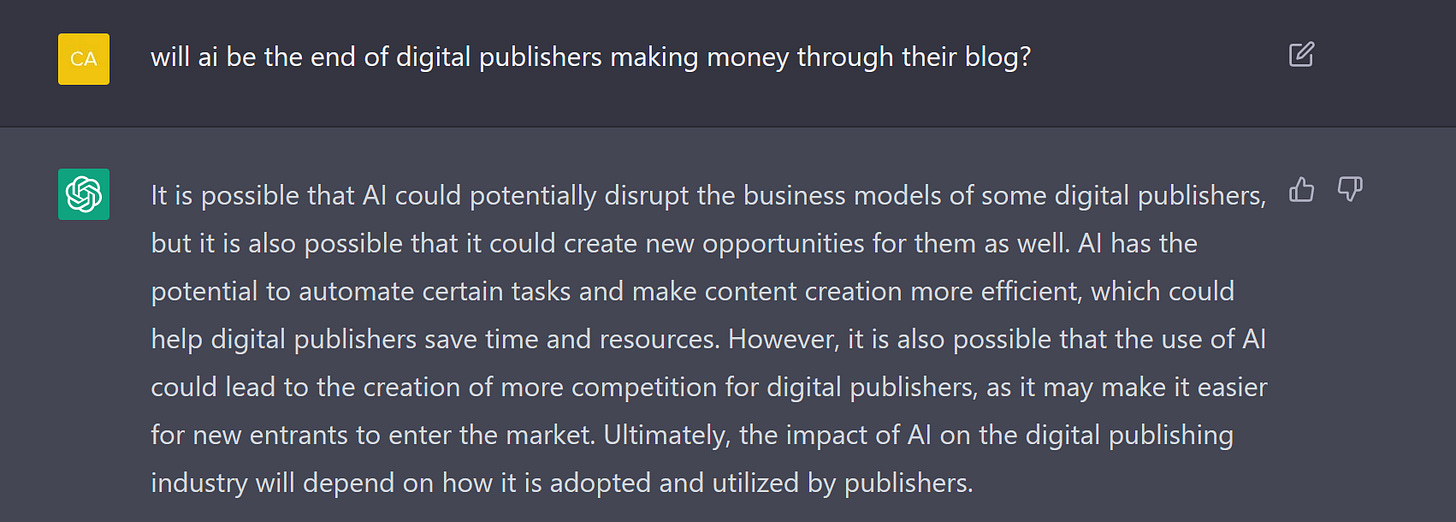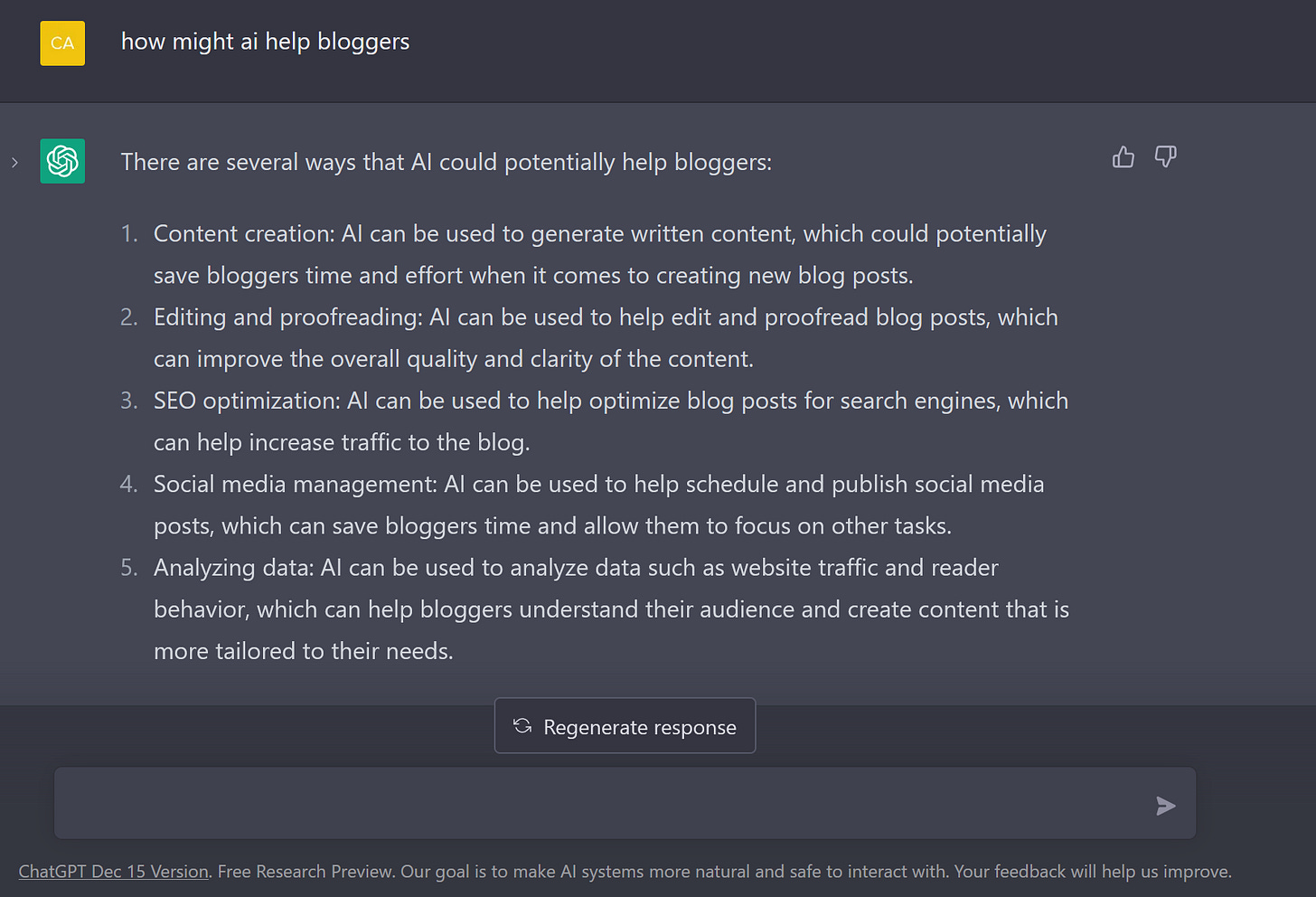2023 Blogging Goals, Plans, Experiments
Building out niche site portfolio, experimenting with AI, doubling down on high quality content
Do you like this featured blog image? Become a paid subscriber and get access to our Canva template library of images like this one, that you can edit in seconds!
Hey Everyone!
I hope your 2023 is off to a fantastic start!
In case you missed it, I launched a new series on my main website (Blogging Guide) which will chronicle my successes, failures, and insights based on the monthly progress of my niche site portfolio, which, in 2023, will consist of 15+ sites.
Whether you are just starting out as a blogger, or are an experienced digital publisher, my hope is that this series will be both entertaining and educational.
Be sure to check out the latest posts!
While I’ve been working as a digital entrepreneur for a while now, this is really the first full year where I’m putting other client work on hold, pausing new updates on existing digital businesses that I have, and am exclusively focusing on blogging.
As I noted in the December 2022 report:
For most bloggers, December was a rough finish to an already difficult year, in terms of display ad revenue.
And my sites were no exception.
RPMs continued their drop from end of November until the end of December, finishing the year at historical lows.
In addition to historically low RPMs in Q4 2022, 2023 has been a rough start for many bloggers. If you are active on Facebook, Reddit, or any type of blogging related forum, you’ve probably seen comments like these:
Not to mention the general fear that ChatGPT has created among those who played around with it a bit:
So with all this doom and gloom, you might be wondering:
Why would you be doubling down on building content sites right now Casey?!
There many reasons, but here are a three of the big ones:
1. Blogging/Niche Sites Have Extremely High ROI
As I wrote in a recent post on Profitable Blogging Investments:
Blogging is one of the most lucrative online businesses that nearly anyone can create. With very high profit margins and multiple options for monetization, it makes sense that more and more bloggers are treating their blogs like a proper business.
Websites have been bought and sold as investments for years. However, it is only more recently that larger investors have begun investing in sites, and ultimately purchasing them, regardless of their size.
When I first started creating online businesses over 10 years ago, it was hard to sell an online business for a monthly multiple of more than 10x-15x. It was simply viewed as too volatile. And even if someone did want to buy your digital asset, there was very little demand for high dollar sales, even at a generous valuation for the buyer.
Today, companies like Motion Invest act as a private equity firm, directly buying blog and other digital assets that produce income. As they note on their own site, sites sold through Motion Invest sell for an average multiple of 35x (that is 35 times monthly profit), or nearly the equivalent of three years profit.
And these valuations continue to rise every year. It is not uncommon to see established sites sell for 40x-50x multiples. And it’s easy to see why.
Compared to a more traditional investment, like real estate, an income producing blog has a much higher ROI, and the payback period is much shorter.
For example, if you were to compare buying a blog as an investment to buying a piece of commercial real estate, a fast food franchise, or a self storage facility, the fact that you could recoup 100% of your investment with a blog/niche content site within 2-3 years seems like a tremendous opportunity compared to the 7-15 year average return needed by the more traditional investments.
Obviously there are plenty of unique risks depending on how your site is monetized, but in general, any asset with an extremely high ROI will eventually attract the attention of investors.
2. Q1 RPMs Always Consist of Huge Drops
The anger over the severe Q1 RPM drops is largely over-hyped. Every year, RPMs tend to drop 40%-60%.
I think what is exacerbating the situation is the fact that November and December RPMs did not see their usual holiday surge.
Granted, this was indeed very disappointing.
But given that many economists are suggesting that 2023 will be a substantial recession (which would suggest companies are pulling back on their ad spending), this seems like a macro trend that will affect many businesses (not just content publishing):
Barclays Capital Inc. says 2023 will go down as one of the worst for the world economy in four decades. Ned Davis Research Inc. puts the odds of a severe global downturn at 65%. Fidelity International reckons a hard landing looks unavoidable.
If anything, the fact that some bloggers are rattled enough to rush to selling their sites means that there will be plenty of buying opportunities this year, for those who have wanted to have an established site, but have struggled to build one.
Or, there may simply be less competition, as the general uncertainty pushes many content creators away from making money online.
3. AI is Proving Instrumental as a Content Production Tool
It is possible that AI could potentially disrupt the business models of some digital publishers, but it is also possible that it could create new opportunities for them as well. AI has the potential to automate certain tasks and make content creation more efficient, which could help digital publishers save time and resources. However, it is also possible that the use of AI could lead to the creation of more competition for digital publishers, as it may make it easier for new entrants to enter the market. Ultimately, the impact of AI on the digital publishing industry will depend on how it is adopted and utilized by publishers.
There are several ways that AI could potentially help bloggers:
Content creation: AI can be used to generate written content, which could potentially save bloggers time and effort when it comes to creating new blog posts.
Editing and proofreading: AI can be used to help edit and proofread blog posts, which can improve the overall quality and clarity of the content.
SEO optimization: AI can be used to help optimize blog posts for search engines, which can help increase traffic to the blog.
Social media management: AI can be used to help schedule and publish social media posts, which can save bloggers time and allow them to focus on other tasks.
Analyzing data: AI can be used to analyze data such as website traffic and reader behavior, which can help bloggers understand their audience and create content that is more tailored to their needs.
This sentiment, which I believe is essentially correct and conveys the general message I was about to write, was generated by ChatGPT in under 5 seconds 😉
But as ChatGPT correctly noted, it’s the ways in which AI can help bloggers scale their content production, which make the technology a win (at least for early adapters).
I’ve already been able to save thousands of dollars and hundreds of hours by having ChatGPT perform tasks, such as:
Writing meta descriptions for my blog posts
Generating alt text for images
Finding untapped niches or new blogging topic clusters
Analyzing my existing content, and suggesting relevant and in demand articles that I could write about to meet existing search queries
Providing data, sources, and reference material for more technical posts
Organizing my own data and identifying patterns around post performance
Writing outlines which can be used as content briefs for those instances in which you do decide to outsource blog writing to other (human) writers
Conclusion
Ultimately, there is a lot of uncertainty around the long term viability of digital publishing and blogging, for those creators that are unwilling to adapt.
And perhaps, savvy bloggers, producing high quality content, will not notice a drop in SERPs in the near future.
There was a similar fear during the introduction of Ad Blockers. Many said the days of bloggers making money through ad driven content were over.
Ads have not only endured, but RPMs have generally gone UP since the launch of these ad blocking tools.
And even if ads had been destroyed, savvy publishers were already diversifying their income sources with affiliate marketing, membership/subscription communities, or by selling digital products.
If you are willing to assume some risk, take the time to understand how AI tools can act as a free (or low cost) assistant, and enjoy writing, there has still never been a better time for creators to escape the 9-5, and make a living as a blogger.
Until next time!
Casey













